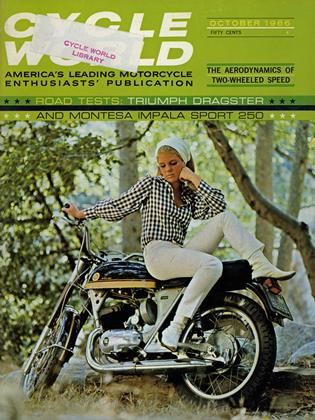MAYHEM MIDST THE MAPLES
8th Annual Grafton Motocross
THERE’S A PIECE of upsy-downsy woods area in Vermont where, once each year, the traditional calm that has inspired many a New England bard is broken by outdoor activity of a different nature. The Grafton Motocross is a strange thing, looked forward to all year long; for two days, its sounds rip through the trees like driving winds and then it is gone and the loam is left for another year to the silent workings of worms and poets.
The track is fast (some competitors say too fast to be compared to European motocross) and interesting. This, the outdoorsy camping cum folksing atmosphere, and the hospitality of natives and peace officers have made the race extremely popular. This was its eighth year — relatively few for a “classic” — but it drew 248 entries, several of international fame, and an estimated 10,000 spectators. Not bad for an AMA sportsman race.
(Continued on page 102)
The competition itself carries an air of suspense and intrigue unmatched by any other New England scrambles. This perhaps stems from the 1961 meet, in which a New England team routed a group of visiting firemen from California in the first example of what has become an annual challenge meet.
Since 1962, the challengers have been Canadians, and the reigning U.S. hero has been Ex-Canadian Joe Bolger, who rides spotless machinery in an equally spotless style.
Riders who make this event what it is included Don Gore, instrumental in defeating the Californians in ’61; Canadian Yvon Duhamel, No. 1 terror of French Quebec; Pennsylvania Expert No. 1 Ed Varnes, who has traveled north across the border to win on Canadian road circuits; and Canadian Jack Hunt, another recent returnee from the motocross wars in Europe.
The challenge races, for 500 and 250cc classes, took place both days. The final result is determined from the total points amassed from all races run. This scoring system lends itself quite well to team events, as it penalizes a rider heavily for not finishing all heats, yet gives no particular advantage to a team with only one or two outstanding riders.
Canada won its first overall victory ever, dominating the 500 races both days and coming from an inferior Saturday position to win the 250 on Sunday. Testifying to the roughness of the event, several Canadian teamers had to borrow new machinery to complete the series.
In the first day of 250 competition. Joe Bolger, Bultaco, got off to a bad start in the first heat. Canadian Dave Sehl won it on an H-D Sprint, which is a surprising feat, as one doesn’t normally think of the Sprint as ideal rough ground machinery (he switched to Bultaco Sunday). Bolger returned to his usual good form in the second set. Ron Jeckel, Bultaco rider from Glens Falls, N.Y., turned in a great performance and drew more cheers than winner Bolger. In spite of heavy pushing by Canadians Sehl and Beasman, the U.S. riders retained a slim lead at the end of the day. But, on Sunday, fine riding by Bolger could not hold back consistent good riding by the opposition and the 250 ended in an overall win for Canada, 453 points ahead.
In the 500 contest, Continental GPstyle motocross machines seemed to be the mode: three 360cc CZs, a raft of 441cc BSA Victor Grand Prix (the Jeff Smith replica, not the Special), and a Matchless Metisse. Then there was a mass produc-
tion 500cc twin ridden by George Cunha of Johnston, R.I.
As if to disprove everybody’s theory about light weight getting one there faster, Cunha took his Trumpet and soundly trounced his GP-style opposition in overall individual points.
As in the 250 matches, however, the U.S. team was not up to Cunha’s standards and the Canadian team proved more consistent, with Duhamel (CZ), Hunt (Metisse) and Gerry VanderEyken (CZ) scoring strongly. One USA rider who might have helped turn the balance was Mel Ganscos (Smith-Victor) of Bridgeport, Conn. Unfortunately, he took a header on Saturday and had to return trackside as a spectator, having sprained his shoulder. Canada thus won the 500 series by a wide margin — 883 points.
In addition to other non-team scrambles, the Grafton weekend also included a short enduro, 24 miles long, which drew 70 entries and an observed trials, in which 77 participated.
The trials is also a challenge meet and this year was won by U.S. Team No. 1, composed of Gendrau, Thibodeau and Decubellis.









